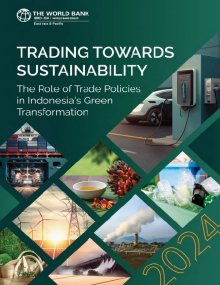Video: How Trade Reforms Can Speed Up Indonesia’s Green Transformation
Key findings
Although trade flows facilitate emissions, they are also a critical part of the solution, including through trade in environmental goods (EGs) and plastic substitutes‒with important economic spillovers. This report provides a detailed analysis of the role of trade and trade policy in Indonesia’s green transition.
- Finding 1: Indonesia’s green competitiveness has declined in recent years but Indonesia has untapped potential in exports of EGs and plastic substitutes and the private sector, especially firms involved in global value chains, will be key to realizing Indonesia’s potential in green trade.
- Finding 2: While Indonesia committed to reducing tariffs on some EGs and took steps to ensure more environmentally sustainable palm oil and timber exports, Indonesia does not participate in most multilateral initiatives and environmental provisions in trade agreements are weakly enforceable in most cases.
- Finding 3: Average tariffs are low, but Indonesia’s MFN (Most Favored Nation) tariffs on EG imports remain high. Tariff reductions and the regional liberalization of tariffs on EGs trade among APEC countries and under the WTO EGA would create important “trade creation” effects, boost Indonesia’s EG trade and facilitate firm entry into EG markets.
- Finding 4: Estimates suggest that some NTMs impose significant costs‒equivalent to up to a 30 percent tariff for some EGs and plastic substitutes, and some measures negatively affect firms. In addition, local content requirements (LCR) aimed at creating local manufacturing capacity could also be a deterrent to growth.
- Finding 5: LCRs and nine out of nearly 90 non-tariff trade measures‒including their estimated tariff equivalents, cost relative to ASEAN countries, overall incidence and a survey of firms trading in EGs‒are suggested for review and possible reform
The recommendations emerging from these findings are as follows:
- Reduce remaining tariffs on imports of EGs and plastic substitutes‒including through multilateral participation.
- Streamline NTMs on EGs and plastic substitutes and conduct a systematic and periodic review of trade regulations.
- Work toward a harmonization of product standards across markets as well as coordination on climate policies that are likely to affect trade to better enable the private sector.
- Conduct regular reviews of local content requirements (LCRs) on renewable energy.
- Include enforceable environmental provisions in trade agreements and participate in plurilateral and multilateral trade policy initiatives on EGs.
- Strengthen the complementarity between trade and climate policies.
Watch the report launch event
